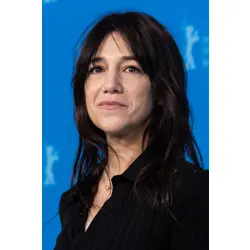 Charlotte Gainsbourg
Charlotte GainsbourgCharlotte Gainsbourg is in Berlin, serving on the Mike Leigh's jury at the Berlin Film Festival. “After hanging up with you, I'm going to quickly go downstairs, and we're off to a secret place to deliberate,” says the 40-year-old actor, singer, and descendent French pop-cultural royalty. She, as juror, has sworn oaths of secrecy (and signed non-disclosure contracts) so, Gainsbourg can't discuss what films she's about to 'fight for', and whether that included the eventual winner, the Italian documentary Caesar Must Die. But she's glad to be “going back to theatre again” after a nine month hiatus after the birth of her third child, Joe, in 2011.
Gainsbourg didn't develop a formative love of film in theatres, though; her pathway into cinema came from a childhood spent on sets, with her mother, Jane Birkin, and father, Serge Gainsbourg. “From the first time I saw my mother work, I got an idea of how wonderful it was to be on set,” Gainsbourg recounts. “Because I was so young, it was really about the excitement of being a child in an adult's world. It was just the best holiday I'd ever had: being on my own without my parents, being treated as a child but able to engage with adults on their own terms. I remember wanting to work in every department. I was trying to go with the electricians. Being away from home but being part of a group, that's what appealed to me, at first.”
Gainsbourg was just 12 when she made her own film debut, in Élie Chouraqui's Paroles et Musique, and she remembers her only goal, at that age, being “trying to please a director”; the budding thesp operating with no formal training. “At the beginning, I was just doing it in such a spontaneous way, with no fear, also,” offers Gainsbourg. “There was something completely innocent about it, not too much thought. It was very instinctive. Today, I hope I still have some instinctiveness, and that spontaneity hasn't changed too much, but I do enjoy preparing a part, and getting into a part in a different way. There's so much more reflection on the work as an adult. Sometimes, I wish I could go back to that sort of innocence. But there is one real similarity: just wanting to be submerged by the material, and just forgetting about yourself.”
Gainsbourg submits that moments of physical struggle – “go[ing] through violence under the protection of the film” – are, in her experiece, the easiest place to 'forget'. Perhaps this explains her recurring relationship with Lars von Trier, with whom she's already made the brutal Antichrist and cold Melancholia, and, “if all goes to plan”, will work with again on the 'quasi-pornographic' Nymphomaniac, due to be shot mid-2012.
Don't miss a beat with our FREE daily newsletter
Gainsbourg's work with von Trier has been the only cinematic constant – along with a shoot on location in South Queensland for Julie Bertucelli's The Tree – in the past three years. That's due in part to new-motherhood, but also to Gainsbourg committing herself to her adopted singing career. She made her debut, as 15-year-old ingénue duetting with daddy, on 1986's Charlotte Forever, but – due in part to the controversial single Lemon Incest, and the semi-scandal it attracted in England – waited 20 years to make a second LP. That came in 2006 with 5:55, which found Gainsbourg collaborating with retrofuturist synth-muzakists Air. Even still, it felt like another digression alongside acting; especially given the songs were never performed live.
“I turned down touring for 5:55 because I knew I wasn't going to be able to perform with Air,” Gainsbourg says. “And that was the whole purpose of that album; I had made this record with them, so I couldn't imagine going and touring with them not there. That idea made me feel very, very shy. Too scared. So I turned it down, and then I felt frustrated about that.”
After suffering a cerebral hemorrhage in 2007, Gainsbourg found thematic inspiration for another LP – 2009's IRM (the French translation for 'magnetic resonance imaging'), made in collaboration with Beck – and the conviction that she was going to overcome her fears. “For me it was much more difficult than acting, and really, really different,” offers Gainsbourg. “Because, performing, you have to acknowledge the audience; it's very obvious that you're in front of them, looking at them. And there's no hiding: I couldn't pretend to be a character just for a camera, I just had to be myself, and that felt so exposing to me.”
Gainsbourg felt doubly exposed because, in her mind, she was sure her performances were going to be scrutinised. “I had to reassure myself that people weren't judging me as harshly as I was judging myself,” Gainsbourg says. “I thought that, because of who my parents are, that people would come at me with this sceptical eye; that I'd have to prove to them that I was worthy of doing this, that I was capable of doing this. That's what I was trying to prove to myself, and I was comfortable with that, but thinking that I had to try and prove that to other people was scary.”
The recently-released live CD/DVD set Stage Whisper was made as documenting proving, to its maker, that she'd overcome her hang-ups about being a singer, on stage. “It was a very, very big step for me, I felt like I needed it commemorated,” say Gainsbourg. “Because it's going to the complete opposite of who I think I am, and my own persona. It's wonderful for someone who is as shy as myself to be able to experience this different way of performing, now, which is sharing myself with an audience in a very open, direct way.”


















